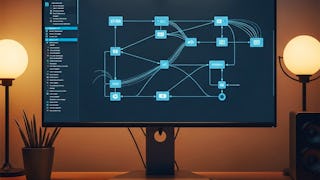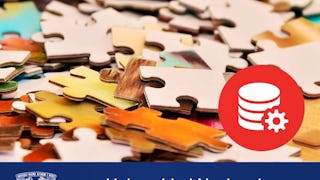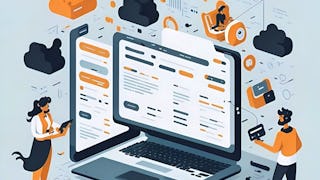Get started with NoSQL Databases with this beginner-friendly introductory course! This course will provide technical, hands-on knowledge of NoSQL databases and Database-as-a-Service (DaaS) offerings. With the advent of Big Data and agile development methodologies, NoSQL databases have gained a lot of relevance in the database landscape. Their main advantage is the ability to handle scalability and flexibility issues modern applications raise.

Enjoy unlimited growth with a year of Coursera Plus for $199 (regularly $399). Save now.

Introduction to NoSQL Databases
This course is part of multiple programs.



Instructors: Rav Ahuja
56,643 already enrolled
Included with
(367 reviews)
Recommended experience
What you'll learn
Differentiate among the four main categories of NoSQL repositories.
Describe the characteristics, features, benefits, limitations, and applications of the more popular Big Data processing tools.
Perform common tasks using MongoDB tasks including create, read, update, and delete (CRUD) operations.
Execute keyspace, table, and CRUD operations in Cassandra.
Skills you'll gain
Details to know

Add to your LinkedIn profile
15 assignments
See how employees at top companies are mastering in-demand skills

Build your subject-matter expertise
- Learn new concepts from industry experts
- Gain a foundational understanding of a subject or tool
- Develop job-relevant skills with hands-on projects
- Earn a shareable career certificate

There are 5 modules in this course
NoSQL means Not only SQL. The term refers to a class of databases that are non-relational in architecture. NoSQL databases have their roots in the open-source community and have become more popular due to the demands of Big Data. In this module, you will learn about the characteristics of NoSQL and the four main categories of NoSQL databases: document, key-value, column, and graph. You will explore the differences between the ACID and BASE consistency models, the advantages and challenges of distributed systems, and the CAP theorem and its characteristics. You will also learn how to decide when to use RDBMS and when to use NoSQL.
What's included
11 videos2 readings4 assignments9 plugins
MongoDB is a document-oriented NoSQL database. MongoDB databases are easy to access by indexing. These databases support various data types, including dates and numbers. MongoDB is the most popular NoSQL database today, empowering users to query, manipulate, and find interesting insights from their collected data. It can also be used for various purposes because of the flexibility of storing structured or unstructured data. In this module, you will learn about the characteristics of MongoDB and expand your hands-on working knowledge of MongoDB performing various common tasks, including create, read, update, and delete (CRUD) operations, limit and sort records, indexing, and aggregation. You will explore replication and sharding, which are capabilities that support the scalability and availability seen with MongoDB.
What's included
8 videos2 readings4 assignments5 app items4 plugins
Apache Cassandra is an open source database that is best used by "always available" applications. These applications require a database that is always available (highly available) and that scales fast in high-traffic situations without compromising performance. Apache Cassandra is best for online services like Netflix, Uber, and Spotify. In this module, you will learn about the characteristics of Apache Cassandra. You will also expand your hands-on knowledge of how to perform common Cassandra tasks, including using the CQL shell, keyspace operations, table operations, and CRUD operations.
What's included
10 videos2 readings4 assignments4 app items4 plugins
This module contains the final project for this course. You will consolidate the skills you learned throughout this course by applying them to a specific scenario. To complete the project successfully, you must demonstrate that you have the skills to perform the tasks outlined. Your peers will grade this final project.
What's included
2 readings1 assignment1 peer review2 app items2 plugins
Database-as-a-service (DBaaS) is a popular solution for hybrid multi-cloud applications. IBM Cloudant is a fully managed DBaaS built on open source Apache CouchDB. Cloudant aims to be the data layer for all your web and mobile applications. In this module, you will find out how simple developing modern web applications is with Cloudant's rich features and JSON document store.You will explore the architecture of Cloudant as a NoSQL database. You will gain hands-on experience with Cloudant capabilities and key technologies. You will also learn how to use the Cloudant dashboard to create and manage your database.
What's included
8 videos3 readings2 assignments3 app items6 plugins
Earn a career certificate
Add this credential to your LinkedIn profile, resume, or CV. Share it on social media and in your performance review.
Instructors


Offered by
Explore more from Data Management
 Status: Free Trial
Status: Free TrialBoard Infinity
 Status: Free Trial
Status: Free Trial Status: Free Trial
Status: Free TrialUniversidad Nacional Autónoma de México
 Status: Free Trial
Status: Free Trial
Why people choose Coursera for their career




Learner reviews
367 reviews
- 5 stars
73.84%
- 4 stars
18.25%
- 3 stars
3.81%
- 2 stars
1.63%
- 1 star
2.45%
Showing 3 of 367
Reviewed on Nov 26, 2023
I thoroughly enjoyed learning about NOSQL Databases.
Reviewed on Sep 22, 2021
The course is great material, explanations and quizzes. The problem with this course is technical. You will face some problems with ibm cloud.
Reviewed on Nov 3, 2023
Great introductory course for main NoSQL databases. Great material and practical assignments

Open new doors with Coursera Plus
Unlimited access to 10,000+ world-class courses, hands-on projects, and job-ready certificate programs - all included in your subscription
Advance your career with an online degree
Earn a degree from world-class universities - 100% online
Join over 3,400 global companies that choose Coursera for Business
Upskill your employees to excel in the digital economy
Frequently asked questions
To access the course materials, assignments and to earn a Certificate, you will need to purchase the Certificate experience when you enroll in a course. You can try a Free Trial instead, or apply for Financial Aid. The course may offer 'Full Course, No Certificate' instead. This option lets you see all course materials, submit required assessments, and get a final grade. This also means that you will not be able to purchase a Certificate experience.
When you enroll in the course, you get access to all of the courses in the Certificate, and you earn a certificate when you complete the work. Your electronic Certificate will be added to your Accomplishments page - from there, you can print your Certificate or add it to your LinkedIn profile.
More questions
Financial aid available,


